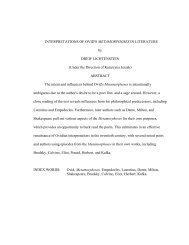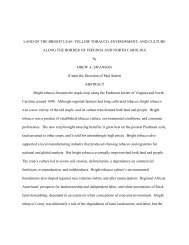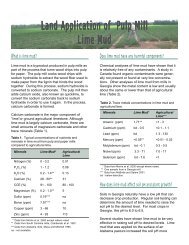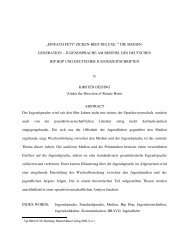RED BOAT TROUPES AND CANTONESE ... - University of Georgia
RED BOAT TROUPES AND CANTONESE ... - University of Georgia
RED BOAT TROUPES AND CANTONESE ... - University of Georgia
You also want an ePaper? Increase the reach of your titles
YUMPU automatically turns print PDFs into web optimized ePapers that Google loves.
on a hill, or at the river-bank early in the morning. Depending on personal features, talent, and<br />
the ability <strong>of</strong> the apprentice, s/he was assigned one, two or sometimes three role types. A more<br />
senior performer <strong>of</strong> similar role type served as a si fu (teacher). The si fu, either a sheng, a dan, a<br />
chou, or a jing passed his own singing, recitative, movement, acrobatic or kungfu techniques to<br />
the younger performers. In return, the apprentice helped take care <strong>of</strong> his si fu’s errands such as<br />
costumes, props, serving tea and sometimes buying special food and cooking for the teacher.<br />
For the red boat troupes, the <strong>of</strong>ficial starting date <strong>of</strong> the performing year was customarily<br />
the 18 th day <strong>of</strong> the sixth month on the lunar calendar (usually around July in Western calendar)—<br />
this is one day before the birthday <strong>of</strong> Gun Yum, a deity. 71 The season lasted until the first day <strong>of</strong><br />
the sixth month <strong>of</strong> the following year. On the opening day <strong>of</strong> the season, performers <strong>of</strong> all the<br />
troupes, led by the managers, gathered at the baat wok wui gun (Eight Harmony Guild for the<br />
Performers) at Wong Saa for a ceremonial ritual. The wu sheng (lead-male kungfu character <strong>of</strong><br />
the troupe) held the name plaque <strong>of</strong> the troupe (called “water plate”) 72 and paid tribute to the<br />
deity Waa Gwong, while loud instruments and fireworks escorted everyone back to the boats and<br />
the plague was hung. Naturally, no ceremony was complete without the generous burning <strong>of</strong><br />
incense to the deities. It was believed that deity worship was absolutely essential for blessing all<br />
activities in a performing season such as travel safety, cooperative weather conditions, smooth<br />
human relations, and good health <strong>of</strong> the troupe members. Some taboos associated with the<br />
ceremony, such as women walking on the ship-board, were strictly prohibited. Also, appearance<br />
<strong>of</strong> a carp onboard was considered a bad omen for the upcoming opera season. Since the carp<br />
was believed to be the reincarnation <strong>of</strong> the dragon without the bones, eating carps was prohibited<br />
71 Wong, Toa. Hung sun tam bai, 17.<br />
72 The name <strong>of</strong> the troupe was written in gold color with black in the background<br />
30






